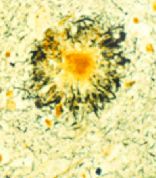
First, the details.
- 204 elderly patients with mild to moderate Alzheimer’s disease were assigned to 1 of 2 treatments for 6 months.
- 1.7 grams of DHA + 0.6 grams of eicosapentaenoic acid (EPA) (DHA/EPA)
- Placebo + 0.6 grams of linoleic acid per day (placebo/omega-6)
- After 6 months, all patients received DHA and EPA for another 6 months.
And, the results.
- With DHA/EPA, weight significantly increased 0.7 kg and 1.4 kg at 6 and 12 months.
- With placebo/omega-6, weight was unchanged at 6 months but increased significantly at the 12 month follow-up after DHA/EPA supplementation was initiated.
- Appetite improved significantly while taking DHA/EPA.
- Absence of the apoEepsilon4 gene and high DHA blood levels were independently related to weight gain.
- Presence of the apoEepsilon4 gene is reportedly a risk factor for Alzheimer’s disease.
The bottom line?
The authors concluded, “A DHA-enriched omega-3 fatty acid supplement may positively affect weight and appetite in patients with mild to moderate Alzheimer’s.”
In addition, “Not carrying the apoEepsilon4 allele and high DHA were independently associated with weight gain.
In my experience, it’s difficult to get people with Alzheimer’s to eat enough. Supplementing their meals with omega-3 seems to be a good idea.
12/13/08 22:47 JR